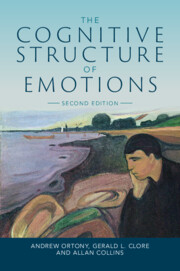Book contents
- The Cognitive Structure of Emotions
- The Cognitive Structure of Emotions
- Copyright page
- Dedication
- Contents
- Figures
- Tables
- Preface to the Second Edition
- Preface to the First Edition
- Chapter 1 Introduction
- Chapter 2 Overview of the Theory
- Chapter 3 Appraisal, the Value System, and Primary Sources of Intensity
- Chapter 4 Factors Affecting the Intensity of Emotions
- Chapter 5 Reactions to Events: I
- Chapter 6 Reactions to Events: II
- Chapter 7 Reactions to the Actions of Agents
- Chapter 8 Reactions to Objects
- Chapter 9 Formalization of the Theory and Additional Issues
- Chapter 10 There and Back Again: OCC and Affective Computing
- Appendix
- References
- Author Index
- Subject Index
Chapter 9 - Formalization of the Theory and Additional Issues
Published online by Cambridge University Press: 04 August 2022
- The Cognitive Structure of Emotions
- The Cognitive Structure of Emotions
- Copyright page
- Dedication
- Contents
- Figures
- Tables
- Preface to the Second Edition
- Preface to the First Edition
- Chapter 1 Introduction
- Chapter 2 Overview of the Theory
- Chapter 3 Appraisal, the Value System, and Primary Sources of Intensity
- Chapter 4 Factors Affecting the Intensity of Emotions
- Chapter 5 Reactions to Events: I
- Chapter 6 Reactions to Events: II
- Chapter 7 Reactions to the Actions of Agents
- Chapter 8 Reactions to Objects
- Chapter 9 Formalization of the Theory and Additional Issues
- Chapter 10 There and Back Again: OCC and Affective Computing
- Appendix
- References
- Author Index
- Subject Index
Summary
Some ancillary cognitive issues are raised, including the fact that characterizing emotions in terms of emergence conditions frees the theory from the bonds of everyday emotion terms, leaving room for projects that explore the relation between emotions cast in terms independent of language-culture and the emotion words of particular languages. Additionally, some functions of emotions relating to attention, coping, and memory are discussed, as is the fact that emotions, construed as necessarily conscious experiences, can have unconscious bases. Finally, the possibility that the emergence conditions of an emotion might not be sufficient to generate an actual emotional experience leads to the introduction of the concepts of emotion potentials and emotion thresholds, wherein the magnitude of an emotion potential must exceed a context-sensitive threshold to allow for an emotion to emerge and its intensity to be computed. With the help of these key constructs, the computational tractability of the theory is illustrated using detailed examples of how characterizations of emotions presented in earlier chapters might be formalized.
Keywords
- Type
- Chapter
- Information
- The Cognitive Structure of Emotions , pp. 204 - 231Publisher: Cambridge University PressPrint publication year: 2022



